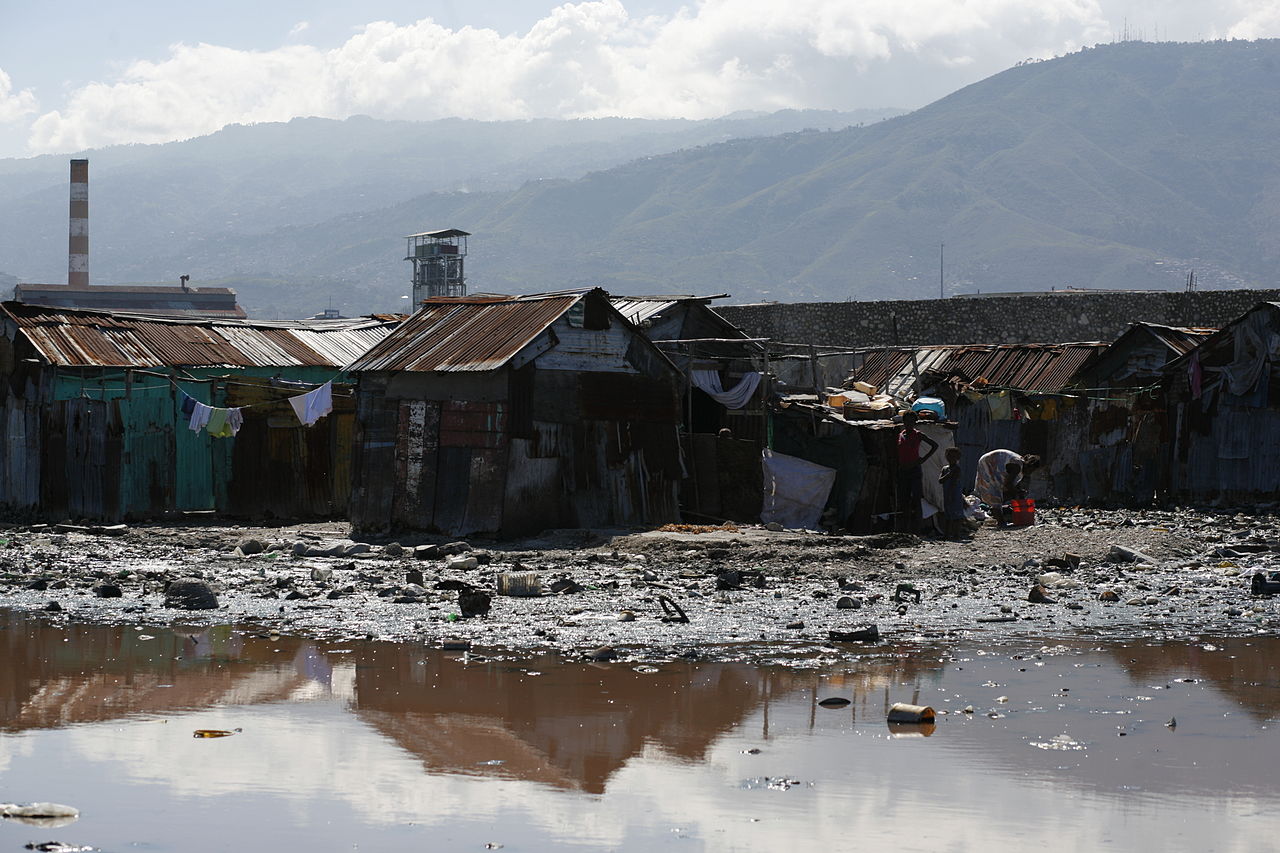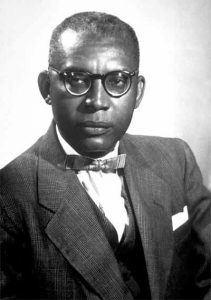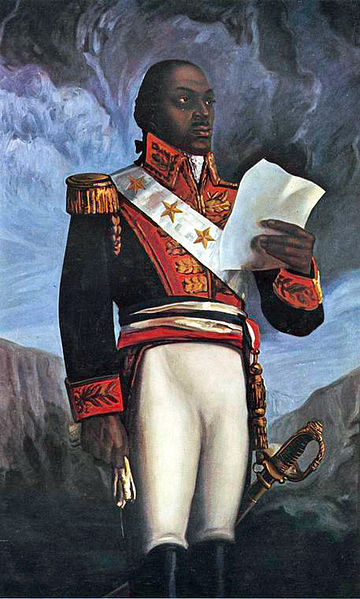History
Who Is to Blame for Haiti's Problems?
More than anywhere else, hope exists in environmental restoration and a healthy international credit.

On July 9, the Root published an article by Michael Harriot entitled “As Haiti Burns, Never Forget: White People Did That.” Obviously, Harriot is not claiming that a mob of white arsonists and rioters descended on Haiti. Although he is never entirely explicit about what he means by “did that,” a fair-minded summary of his hypothesis would read: “The historical actions of France (and the US) are the cause of modern Haitian poverty and thus riots in 2018.”
Specifically, Harriot attributes this poverty to an odious agreement foisted upon Haiti in 1825 by the French, which required Haiti to pay ‘reparations’ to France for lost property after Haitian slaves heroically won their independence in 1804—the lost ‘property’ in question was the Haitian slaves themselves. His complaints about the United States are less clear, but they essentially involve the US turning a blind eye to French abuse.
Harriot is not the first person to claim that Haiti’s present state of poverty, corruption, and violence is the result of French reparations or US imperialism. The narratives along these lines each has its own set of problems, but they are hardly uncommon. So it is strange that Harriot emphasizes that his own hypothesis may sound “harebrained,” “like a kooky conspiracy,” or, most impressively, that it “requires a suspension of disbelief because it is so insane that it sounds like fiction.” There is nothing about Harriot’s hypothesis that sets it outside the realm of historical possibility. Prima facie, the hypothesis is a reasonable one which can then be investigated, tested, and proved to be true or false. In short, it is false. ‘White people’ (ie France) did not cause Haiti to be poor, and they certainly did not cause last week’s riots. Haitian poverty is not a simple system that can be explained solely by pointing out the immoral deeds of historical Frenchmen, and we will need to learn more to know why this is.
The Historical Background
The French deal to recognize Haitian statehood in exchange for reparations of 150 million francs was accompanied by a loan of 30 million francs so that Haiti could make the initial payments. Haiti made a single payment to the French from national savings in 1825, but they did not start making regular payments until 1838, when the deal was renegotiated and reduced to 90 million Francs. The debt and reparations were then paid (mostly) regularly and, in the face of great adversity, Haiti paid it off in 1883.1
This might have been the end of the story, but in 1874 the government took out a foreign loan from France with the goal of restructuring and modernizing their monetary system. Unfortunately, this loan—along with those that followed in 1876, 1896, and 1910—was agreed by woefully corrupt agents on both the Haitian and French sides, and in the end the people and economy of Haiti received very little in exchange for a large external debt.2 There can be no doubt that the Haitian economy was negatively impacted by this, and there is nothing particularly “kooky” about concluding that the effects of reparations and later corrupt loans might have been far-reaching. Of course, the Haitian economy, past and present, is more than just a ledger of debt. If we want to talk about whether France caused Haiti’s poverty we need to learn a little more about the historical Haitian economy.
Haiti has not always been the ‘failed state’ it is today. From its independence in 1804 to the 1890s, Haiti was one of the strongest Caribbean economies. The country consistently placed as one of the top Caribbean exporters, even when it was competing with better funded European colonies. Throughout the nineteenth century, Haiti’s exports grew steadily to match its growing population at the same time that other Caribbean states like Jamaica were falling behind.3 Today, comparisons between Haiti and the Dominican Republic are often made by those who hope to diagnose the causes of Haiti’s poverty and the Dominican Republic’s relative wealth. However, throughout most of the nineteenth century, Haiti consistently outperformed its Dominican neighbor.4 Haiti’s decline, relative to the rest of the Caribbean, began in the 1890s and it has not enjoyed a meaningful recovery since.
Haitian history after the decline in the 1890s to the present is worth a brief survey as well. By 1914, the Haitian government was insolvent and highly unstable. In response to the increasingly dire situation, the US invaded Haiti in 1915 to restore order. When the US invaded, the Haitian populace was so disenchanted with their government that only one Haitian soldier resisted the initial occupation.5 Strangely, Harriot does not mention the US occupation as part of his explanation of US culpability in Haiti’s poverty. Perhaps this is so he can maintain that since Haitian independence “a white man has never ruled the place we now call ‘Haiti.’”

Francois Duvalier aka ‘Papa Doc’ (1907-1971)
In any case, the occupation lasted until 1934, and while it led to a major expansion of Haiti’s infrastructure, it also saw the inhumane murder of thousands of rebels and dissidents.6 In the late twentieth century, Haiti was dominated by father-son authoritarian dictators François Duvalier and Jean-Claude Duvalier, otherwise known as ‘Papa Doc’ and ‘Baby Doc.’ The Duvaliers’ reign was deeply corrupt and brutally violent, and maintained by a truly disturbing paramilitary terror gang known as the ‘Tontons Macoutes,’ named after a mythical ‘bogeyman’ in Haitian folklore which kidnaps errant children.7 During their reign from 1957 to 1986, it is estimated that between 40,000 and 60,000 political opponents were abducted and murdered. When ‘Baby Doc’ was finally ousted in 1986, the country fell into an unfortunate cycle of revolutions, military coups, and ongoing political repression. This culminated in a Brazilian-led UN peacekeeping occupation in 2004, which ended only last year. Then, last week, Haitians rioted due to a government-mandated increase in fuel prices, which led to Harriot’s article.
This overview of Haitian history is woefully brief, but it will be sufficient to discuss Harriot’s hypothesis that white people are the cause of Haiti’s poverty and the riots.
Why Did Haiti Become Poor in 1890 and Why Has It Remained Poor Since?
To answer this question, we must return to the 1890s and look at the causes of Haiti’s decline. In the late nineteenth century, the Haitian economy was dominated by two products, coffee and timber. Haitian coffee was prized on the world market for its high quality and rich aroma, and it was usually able to compete with cheaper coffee from Brazil.8 In the 1890s, Brazilian coffee over-production increased and world coffee prices dropped. So, while Haiti’s coffee exports steadily increased, coffee revenues plummeted and Haiti did not have the economic flexibility to transfer toward other crops like cacao.
To compound this problem, Haiti’s other major export industry, timber, also ran into a moment of crisis in the 1890s. Initially, Haitian logging was highly regulated and small farmers were not permitted to clear forest land. The legal situation changed in the 1840s to allow for unregulated peasant agriculture, and timber harvesting increased to what may have been sustainable levels for a few decades. However, Haitian timber production spiked in the 1880s and fell drastically just a decade later. It is worth noting that a sizeable portion of later exports consisted of ‘roots’ for years afterward.9 Though deforestation goes back to the colonial period, the 1880s marks the point of over-exploitation that killed the Haitian timber industry and the economic benefits that it brought to Haiti. Of course, the damage of deforestation goes well beyond the loss of sustainable timber economy. The resulting soil erosion and ecological damage has been disastrous. Soil erosion has affected the infrastructure, drinking water, and of course the fertility of land to grow other crops. Numerous international organizations have been attempting to work with small farmers to reforest depleted areas, but soil infertility remains a serious issue and the restoration of the environment has, in a sense, only just begun.10
In addition to these factors, it is worth noting government expenses, other than debt, in the century prior to the decline of the 1890s. Most notably, the military budget of Haiti in the years following independence was 50 percent of government revenue. This decreased with time, but expenditures never dropped below 25 percent until the US occupation. The best argument in defense of this spending was the precarious situation with France and the threat of another invasion before the renegotiation of their agreement in 1838. After this point, it is often argued that Haiti faced real threats from other European powers like Spain and Germany, which each attempted to extract moderate financial concessions from Haiti. However, there are also less sympathetic reasons for the high military budget. Most notably, Haitians were very keen to conquer and keep the Dominican half of the island, and twice attempted to invade it. While one might sympathize with the Haitian leaders’ decision to put so much of their discretionary state income into the military, it was, in hindsight, a poor long-term investment for the young nation. It is a cruel irony that, after 1825, conflict with the European powers and the US was consistently resolved with diplomacy and capitulation. As a result, the Haitian military budget was never really used in the defense of the nation against foreign powers.11
Another major state expense was internal debt. While most of the time Haiti’s debt crisis is discussed in terms of their external debt to the French, and later the US, Haiti had long been borrowing money from its own citizens. In fact, in 1890 the internal debt of Haiti was as large as the external debt. Sadly, attempts to refinance the internal debt were also consistently marred by corrupt Haitian officials with short-term interests.12
Where Are the Haitians?
With this information in mind, we can begin to assess Harriot’s historical hypothesis responsibly. The first thing to address is that factors in economic history that are relevant to modern outcomes are never dichotomies. France’s reparations would count as a ‘relevant’ factor, irrespective of whether they explain 90 percent or 0.9 percent of Haiti’s modern poverty. But, obviously, these two figures would indicate very different things. While arriving at a meaningful numerical estimate of the role of French reparations on the modern state of Haiti is well beyond the scope of this article, we can still safely conclude that, on their own, the damage they caused is nowhere near sufficient to explain the Haitian economy over a century later.
Those who accept Harriot’s claim may counter that the reparation payments were what sent Haiti into a “self reproducing cycle of poverty.” But this too is specious. To get set on such a cycle things need to be pretty bad, and at each ‘turn’ of the cycle things need to still be pretty bad, but not necessarily for the same reasons. In the face of real ongoing explanatory factors like ecological devastation and a corrupt, violent, and unstable political system, it is exceedingly implausible that the French reparations payments have consistently played a fundamental role in perpetuating Haitian poverty for centuries.
On the other hand, the impact of foreign debts was ongoing. Due to the severity of environmental damage, we can have at least moderate confidence that even these debts are no more than a secondary cause of Haitian poverty. But even if foreign debt were the foremost cause, it would still not be reasonable to claim that ‘white people’ or France caused Haitian poverty. The French did not create corrupt Haitian debt out of thin air—in each case they had to go through corrupt Haitians willing to enrich themselves at the expense of their own people.

Toussaint Louverture (1743-1803)
Which brings us to another interesting question about Harriot’s article and those like it: where are the Haitians? As is typical, the only ones mentioned by name are Haiti’s heroic founder Toussaint Louverture and his less admirable lieutenant, Haiti’s second head of state and first self-proclaimed ’emperor,’ Jean-Jacques Dessalines. Where is President Boyer who accepted the French deal? Where is President Pétion who proposed the idea? Or President Nord-Alexis who actually prosecuted corrupt debt creators?13 Where are the Duvaliers who thrived on terror and corrupt loans? Harriot omits any Haitians—good or bad—relevant to the topic and talks about them as if their post-independence history is about little more than the passive endurance of foreign oppression. Harriot seems to assume that, having accepted the deal, Boyer suddenly realized it was terrible and immoral and said, “Well, we’ve got two centuries of poverty, plague, and pestilence, 30 coups, and God knows how many riots ahead of us, so let’s get started.”
One thing Harriot does get right is that the story of Haiti often represents “strength, resistance, and freedom.” But his attempts to explain the present with past oppression have blinded him to the fact that, in the 45 years between 1838 and 1883, Haiti was growing economically in spite of the exact oppression he thinks caused their modern poverty. It is a tragedy that modern identity politics and ideas of victimhood can overshadow a minority group winning in spite of real exploitation. It is a tragedy that the same narrative of victimhood can further obscure an actively ongoing, and solvable, cause of poverty like environmental damage, especially when we know that Haitians have the potential to over come this obstacle as well.
Harriot seems to have a fundamental misunderstanding of the role of debt in the modern world economy. He celebrates the cancellation of Haiti’s debts, and claims that their cancellation was shamefully recent and should have happened years ago. It is true that the cancellation became the right thing to do in recent years, but the debt cancellation is not a victory for a black nation against the white capitalists. It is a defeat. It is a defeat for both Haiti and foreign lenders that wished to see Haiti rise out of poverty. When debt is canceled, it amounts to giving the borrower the unpaid money.
This may seem good for Haiti, but the world (mostly the West) already gives Haiti a large amount of aid. Loans have a different purpose. When the World Bank and the IMF give a developing country a loan, the whole point is that they invest it in things like education and infrastructure and then—this is the best part—pay the loan back. When a nation pays off its World Bank loans they then have credit and a history of reliability. Once this happens, a nation has access to more resources than the World Bank could dream of offering a developing nation. Paying off the IMF and World Bank would have been one of the best ways to set Haiti on a fast track to prosperity. Debt relief of this sort is not a campaign topic of social justice against oppression, it is a sobering admission that efforts to help Haiti have failed.
I have hope for Haiti, but that hope is not found in a French reparations payment for past wrongs. More than anywhere else, hope exists in environmental restoration and a healthy international credit. Give a nation aid and it will eat for a year, give a nation good credit, healthy ecology, and a strategic position next to the worlds wealthiest consumer economy and it could become the fastest and strongest economic miracle the world has ever seen.
Arthur Cook is a graduate student of history and linguistics. You can follow him on Twitter @ArthurVCook
References and Notes:
1 Brière, Jean-François. “L’Emprunt de 1825 dans la dette de l’indépendance haitienne envers la France,” in Journal of Haitian Studies. Vol 12, No 2. (Center for Black Studies Research, 2006) 132-133. Harriot claims that it took until 1947 to pay off all of the interest on the debts, but I have only found this in an uncited wikipedia article and in a Haitian appeal for the French to return the money. I have also found 1915 as a possible date. It seems reasonable to go with 1883 though, as it is the date cited by actual historians.
2 Bulmer-Thomas, Victor. The economic history of the Caribbean since the Napoleonic wars. Cambridge: Cambridge University Press, 2012. pp 182.
3 Bulmer-Thomas, 195.
4 Bulmer-Thomas, 197.
5 Bulmer-Thomas, 190.
6 Other authors do imply that the oppression during the US occupation is a cause of Haiti’s modern poverty. The US occupation was immoral, but not because it caused lasting poverty. After the revolts and atrocities that occurred early on, the occupation was typified by a forced expansion of infrastructure, public health projects and an unprecedented level of order and stability. We all know that these things do not cause poverty. The occupation saw real material improvement for many Haitians. So why do we condemn the occupation? We condemn it because the US killed people and forced them to do things. Claiming this as a cause ignores both the actual causes of poverty and the real moral problem with the occupation.
7 Britanica, “François Duvalier.”
8 Bulmer-Thomas, 173.
9 Bulmer-Thomas, 165.
10 Mclintock, Nathan. “Agroforestry and sustainable resource conservation in Haiti: a case study.”
11 Bulmer-Thomas, 166-8.
12 Bulmer-Thomas. 181.
13 Bulmer-Thomas. 181.





